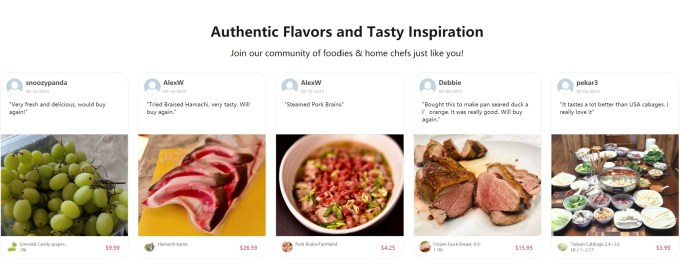When Larry Liu moved to the U.S. in 2003, one of the first challenges he experienced was the lack of Chinese ingredients available in local groceries. A native of Hubei, a Chinese province famous for its freshwater fish and lotus-inspired dishes, Liu got by with a limited supply found at local Asian groceries in the Bay Area.
His yearning for home food eventually prompted him to quit a stable financial management role at microcontroller company Atmel and go on to launch Weee!, an online market selling Asian produce, snacks and skincare products.
Like other players in grocery e-commerce, the five-year-old startup has seen exponential growth since the coronavirus outbreak as millions are confined to cooking and eating at home. Nearly a quarter of Americans purchased groceries online to avoid offline shopping during the pandemic, according to Statista data. Online grocery giants Instacart and Walmart Grocery boomed, both hitting record downloads.
In a Zoom call with TechCrunch, Liu, who’s now chief executive of Weee!, said that COVID-19 played a “very important role” in his company’s recent growth, and paved its way to profitability.
“It happened a lot faster than we expected, but we were already growing rapidly with even more ambitious plans for expansion prior to COVID-19,” he said. “People are buying more because restaurants are closed. Many are first-time users of grocery delivery.”
The startup’s revenue is up 700% year-over-year and is estimated to generate an annual revenue in the lower hundreds of millions of dollars.
Online grocery, the WeChat way
Liu brought to America not only culinary finds from his culture; he also took his cue from the various ways e-commerce took shape in China.
Before Weee! pivoted to what it does today — a one-stop shop and delivery app for specialty and staple Asian products — it was a “group-buying” service for Chinese groceries, an idea that had its roots in a phenomenon spawned by WeChat.
In 2014, the messenger app was quickly becoming a necessity for Chinese people to communicate and manage daily errands. Thrifty shoppers took advantage of group chats and invited acquaintances to buy everything from Boston lobsters to Malaysian durian collectively to negotiate a cheaper deal. Before long, the practice had spread to overseas Chinese communities, the majority of whom used WeChat regularly.

Liu noticed that his Chinese neighbors began organizing group purchases of rare food, like freshly caught ocean fish, on WeChat. “This was happening well before Pinduoduo and weishang even became buzzwords in China,” Liu recalled, referencing the Nasdaq-listed Chinese e-commerce startup that made its name by blending social and shopping experiences. Weishang is short for “WeChat and business” in Chinese, referring to e-commerce sellers on WeChat.
Liu was stunned that with WeChat, even non-technical individuals could start selling online instantly. There was one hurdle, however: It was extremely difficult to keep a tally of who ordered how much of what inside the chats. People bombarded the group-deal negotiator with a barrage of orders like shoppers shouting out what they wanted at a crowded wet market.
Liu believed he had a solution and launched Weee! in mid-2015. Joining him as co-founders were two old friends from his time at Shanghai Jiao Tong University, during which the three young men picked up the hobby of selling used items on EachNet, an eBay clone that was eventually acquired by the American e-commerce behemoth.
“I have always enjoyed selling things,” the entrepreneur admitted. Liu had continued his part-time pursuit after settling down in the U.S. This time, he built a set of algorithms to automate arbitrage trading, the buying and selling of products to profit from the price difference found between online marketplaces.
Liu’s experience in corporate finance and e-commerce prepared him well for a career in grocery delivery. Weee! began by developing a set of web tools for group-buying leaders and linking them with more suppliers such as local fishermen and family farms. The business boomed and the team raised $10 million in funding to gear up for more growth — except sales was already slowing down.
Liu realized that Weee! was only solving the demand of, in his words, “exciting products.” Users still had to drive to an agreed-upon pickup spot, like a neighborhood Chinese restaurant, and buy their staple food from local supermarkets.
User acquisition, the Pinduoduo way
In mid-2017, the startup pivoted to focus on convenience and choice: a comprehensive delivery service for Asian groceries.

The move meant a major expansion on product selection, which led the company to source more suppliers and set up its own warehouses. Most of its 300 suppliers are based in America, so the impact of the U.S.-China trade war had been slight, according to the founder.
Weee! makes money off the differences between wholesale and retail prices, like traditional supermarkets do. It provides free delivery for purchases over $35, relying on a fleet of third-party drivers. Liu claimed that the startup is able to keep delivery costs down by opting for next-day delivery, rather than the expensive setup of the 30-minute delivery standard in China, where people are accustomed to getting fresh ingredients every day.
“Consumers are willing to wait because the primary grocery shopping trip is planned in the U.S.,” observed Liu.
The company was also able to produce near-zero food waste due to an extremely fast inventory turn. Larry quickly learned that Asian consumers value freshness and quality just as much as value. “The U.S. desperately needed a solution to address spoilage and overstocking inventory, which is inevitable for brick-and-mortar supermarkets — at least before the pandemic hit and panic buying started.”
Offering free delivery and freshness wasn’t enough. Weee! has devised a slew of user incentives like coupons that expire in one hour and discounts for those who successfully invite others to register, tactics that played an extensive role in Pinduoduo’s rise.
“Pinduoduo is definitely an inspiration for us,” Liu said of the Alibaba challenger, which is famous for its gamified user experience.
Most recently, Weee! has been leveraging videos to showcase products, an e-commerce strategy that is becoming a norm in China. Influencers there are seen tasting food and hawking items during live broadcasts. While the combination of live videos and online shopping has not seen much traction in the U.S. yet, Alibaba has vowed to popularize the model in the West. Sera Park, senior communications manager of Weee!, said she was fascinated by how effective live videos were in demonstrating the “freshness” of food.
For Weee!, Instagram and TikTok influencers have played a huge role in evangelizing its products to a wider non-Asian community.

“There are a lot of foodie influencers who tend to be Asian American. They are gaining a lot of traction and people look up to what they are eating,” said Park, adding that the exclusive items found on Weee!, such as kimchee sourced directly from South Korea, can give its influencer partners an edge in a crowded social media space. “Asian food becomes cool for the first time.”
Rise of Asian food
Weee! has its eye on a lucrative sector. A 2019 research from marketing firm Claritas shows that Asian Americans spent roughly $5,000 annually on food at home — about 6% more than average U.S. households. Weee! also noticed that Asian groceries, which span from frozen dumplings and instant noodles to Korean skincare products and Japanese stationery, are gaining popularity among America’s non-Asian populations.
The rising popularity of Asian food — and its culture at large — has smoothed the way for Weee! to fundraise. Liu admitted that it was difficult to land investment in the beginning. “Investors on Sand Hill Road didn’t know what Hmart or 99 Ranch [Asian grocery chains in the U.S.] were, and they didn’t know there was a big demand for Asian grocery.”
In recent years, Liu began seeing more Asian partners at major American venture capital firms. “As large funds became more global, they need to hire people who can grapple with cultural differences,” observed the entrepreneur.
Weee! closed a $50 million Series B funding round in late March, which saw Netflix’s former chief operations officer Tom Dillon joining as a board member. The startup has a current headcount of about 400 employees, most of whom work in warehouses and receive hazard pay during the pandemic. It delivers throughout the Bay Area, Greater Los Angeles Area and Greater Seattle Area and has plans to expand to other communities with dense Asian populations like New York, Dallas and Vancouver, B.C.
Comments from Weee! were updated on Jun 6, 2020.































Comment